Special Report
The 25 Worst Cities for People With Spring Allergies
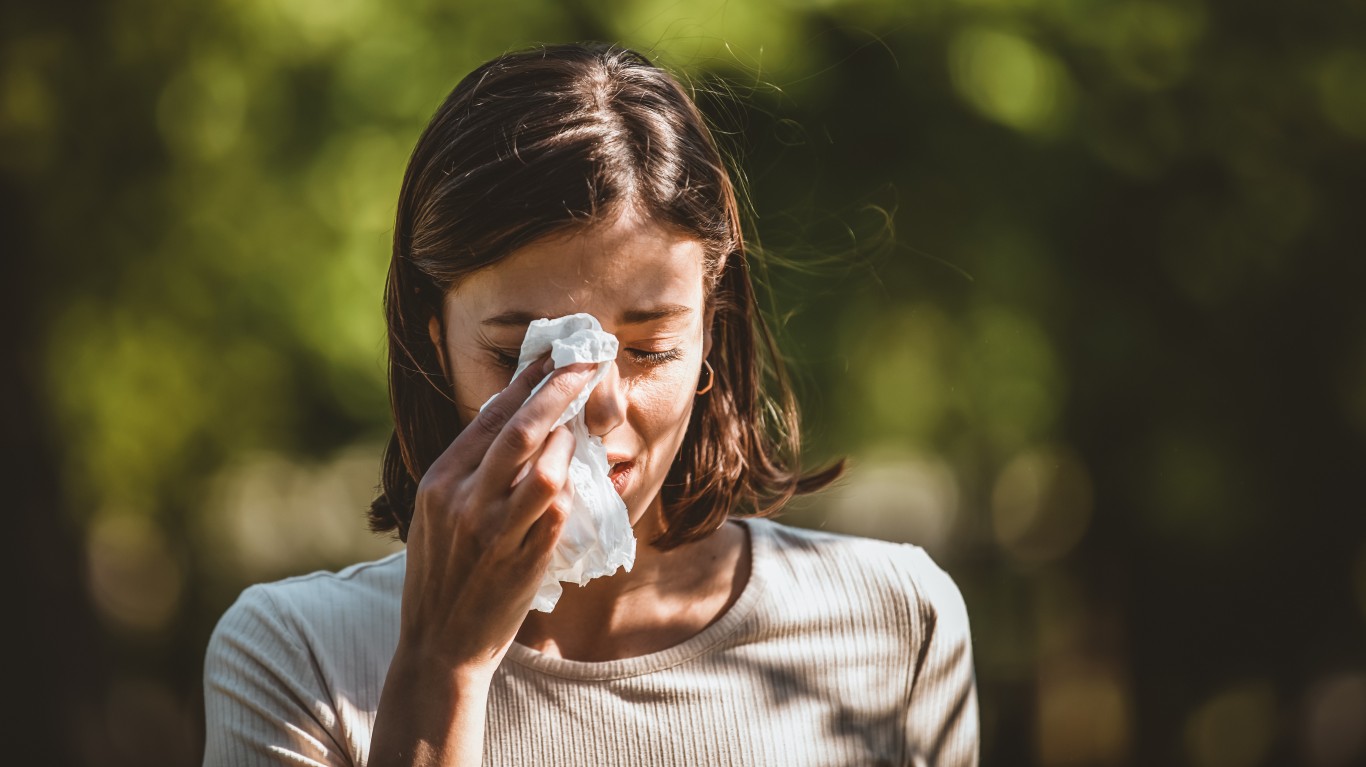
Published:
Last Updated:

The highly encouraged and in some places strictly enforced social distancing due to the COVID-19 pandemic may come as a relief to people with spring allergies.
Early March is usually a time when more than 50 million Americans who suffer from allergic rhinitis, the medical name for hay fever or seasonal allergies, start experiencing the unpleasant symptoms of their immune system’s hypersensitivity to pollen from trees, grass, weeds, or airborne mold spores.
24/7 Tempo reviewed the Asthma and Allergy Foundation of America’s 2020 report on metropolitan cities where people are most affected by spring allergies.
In addition to pollen, air pollution — which is unhealthy for anyone exposed to it — can make life particularly miserable for people with allergies. It is especially true of particulate matter 2.5 pollution (PM2.5), or fine inhalable particles that have a diameter of less than 2.5 microns — about 3% of the diameter of a human hair.
Spring allergies can cause sneezing, stuffy and runny nose, watery eyes, as well as itchy nose, eyes, and mouth, according to the American College of Allergy, Asthma and Immunology — and here are 20 easy remedies that can help relieve allergy suffering.
Click here for the 25 cities that are worst for people with spring allergies
To identify the 25 worst cities for people with spring allergies, 24/7 Tempo reviewed the Asthma and Allergy Foundation of America’s 2020 report on the 100 metropolitan cities where people are most affected by spring allergies. The AAFA ranking is based on a total score, which includes seasonal pollen measures, over-the-counter allergy medication use, and number of allergy specialists. For each city, AAFA obtained a comprehensive index of the population at risk of being affected by pollen and allergy prevalence for each pollen type, using the most recently available 12-month data.
The measure of fine particle pollution (PM2.5) comes from the Environmental Protection Agency’s 2020 report on air quality and air pollutants in the United States. Population figures are from the U.S. Census Bureau’s 2018 5-year American Community Survey.
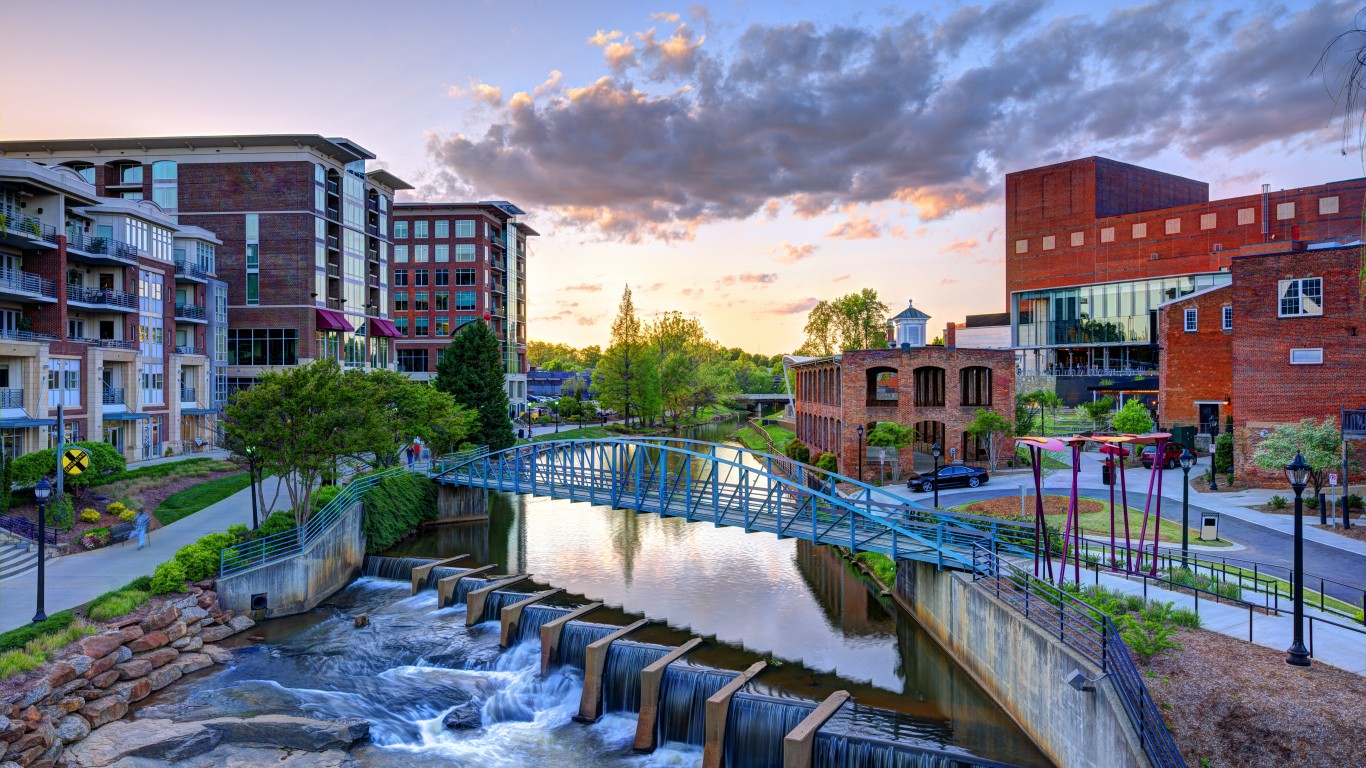
25. Greenville, South Carolina
> Score: 73.3 (Avg: 65.50)
> Rank in spring of 2019: 24th worst city
> PM2.5 pollution 24-hr average: 57 µg/m3 (EPA’s standard is 35 µg/m3)
> Population: 883,853
[in-text-ad]

24. Columbia, South Carolina
> Score: 74.3 (Avg: 65.50)
> Rank in spring of 2019: 19th worst city
> PM2.5 pollution 24-hr average: 63 µg/m3 (EPA’s standard is 35 µg/m3)
> Population: 816,664
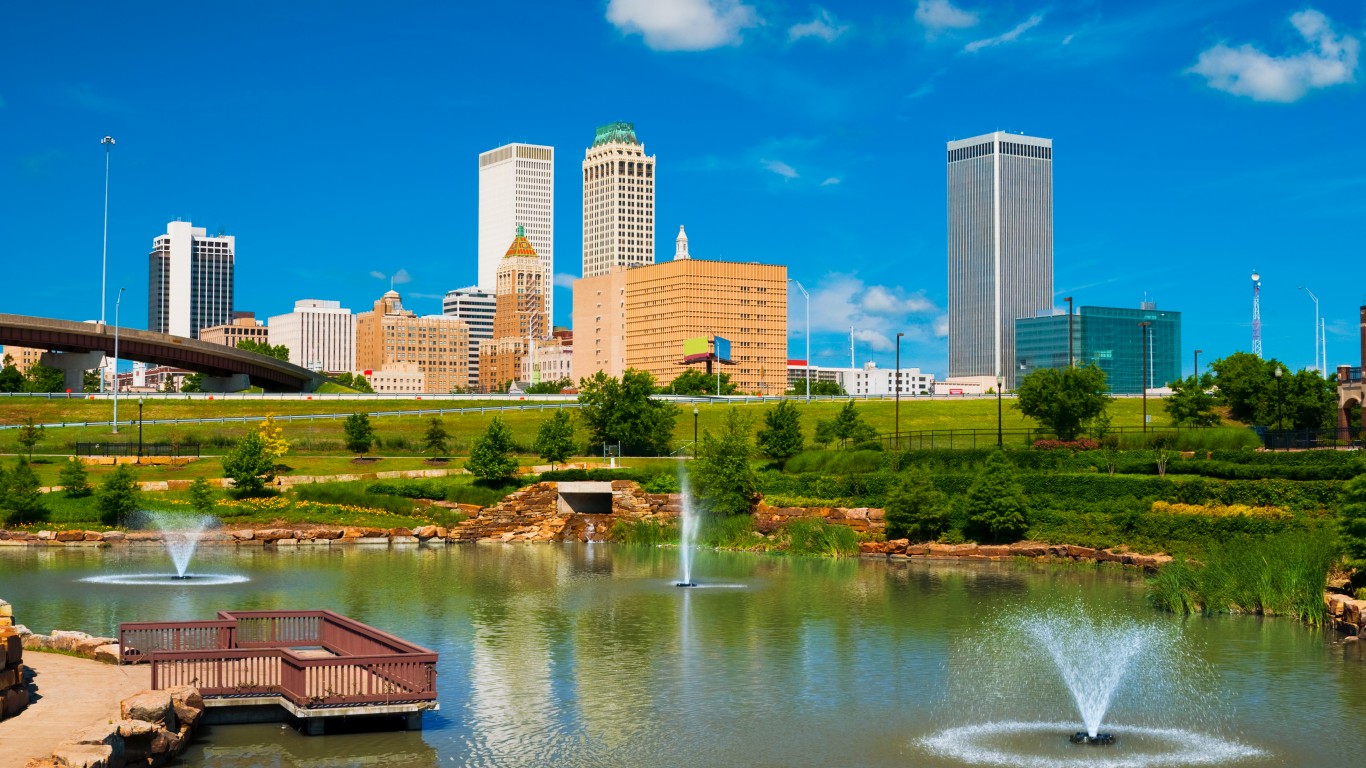
23. Tulsa, Oklahoma
> Score: 75.1 (Avg: 65.50)
> Rank in spring of 2019: 53rd worst city
> PM2.5 pollution 24-hr average: 90 µg/m3 (EPA’s standard is 35 µg/m3)
> Population: 985,233
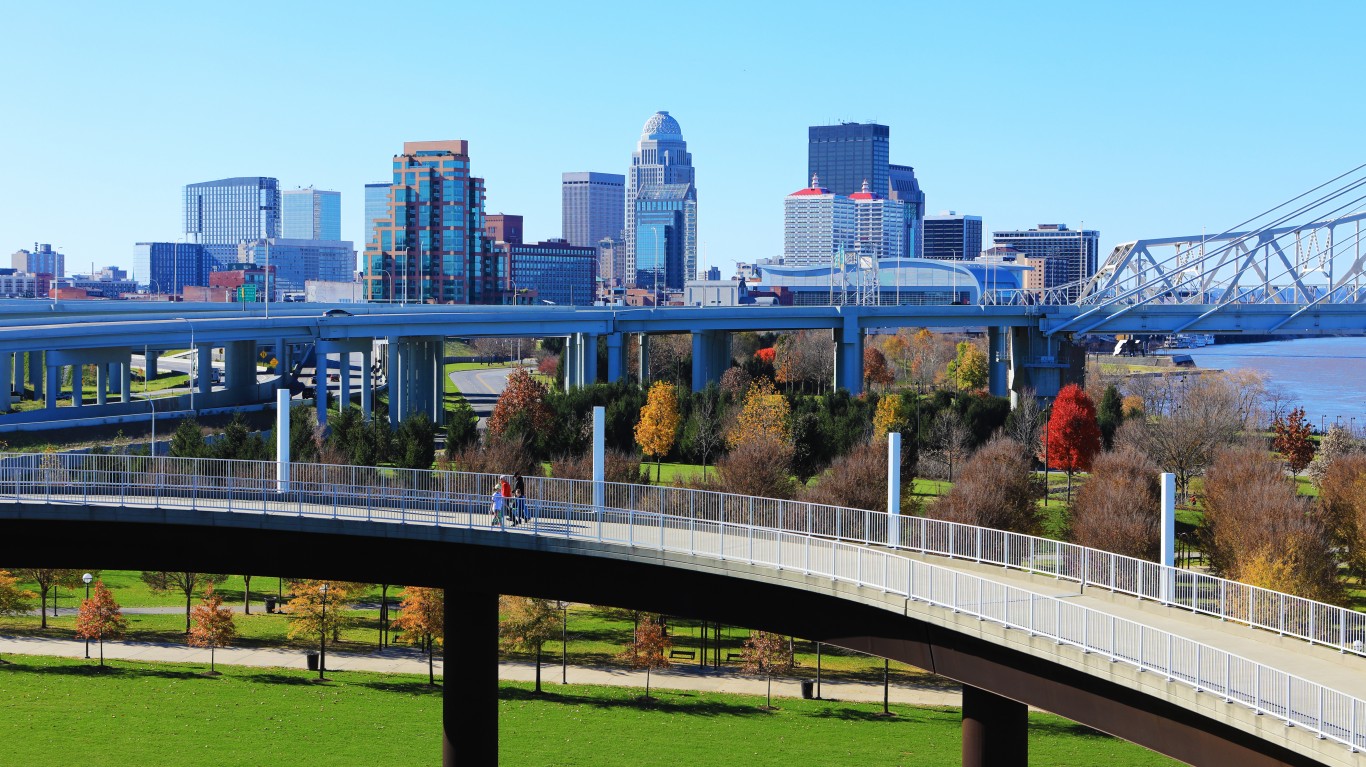
22. Louisville, Kentucky
> Score: 75.3 (Avg: 65.50)
> Rank in spring of 2019: 6th worst city
> PM2.5 pollution 24-hr average: 126 µg/m3 (EPA’s standard is 35 µg/m3)
> Population: 1,285,270
[in-text-ad-2]
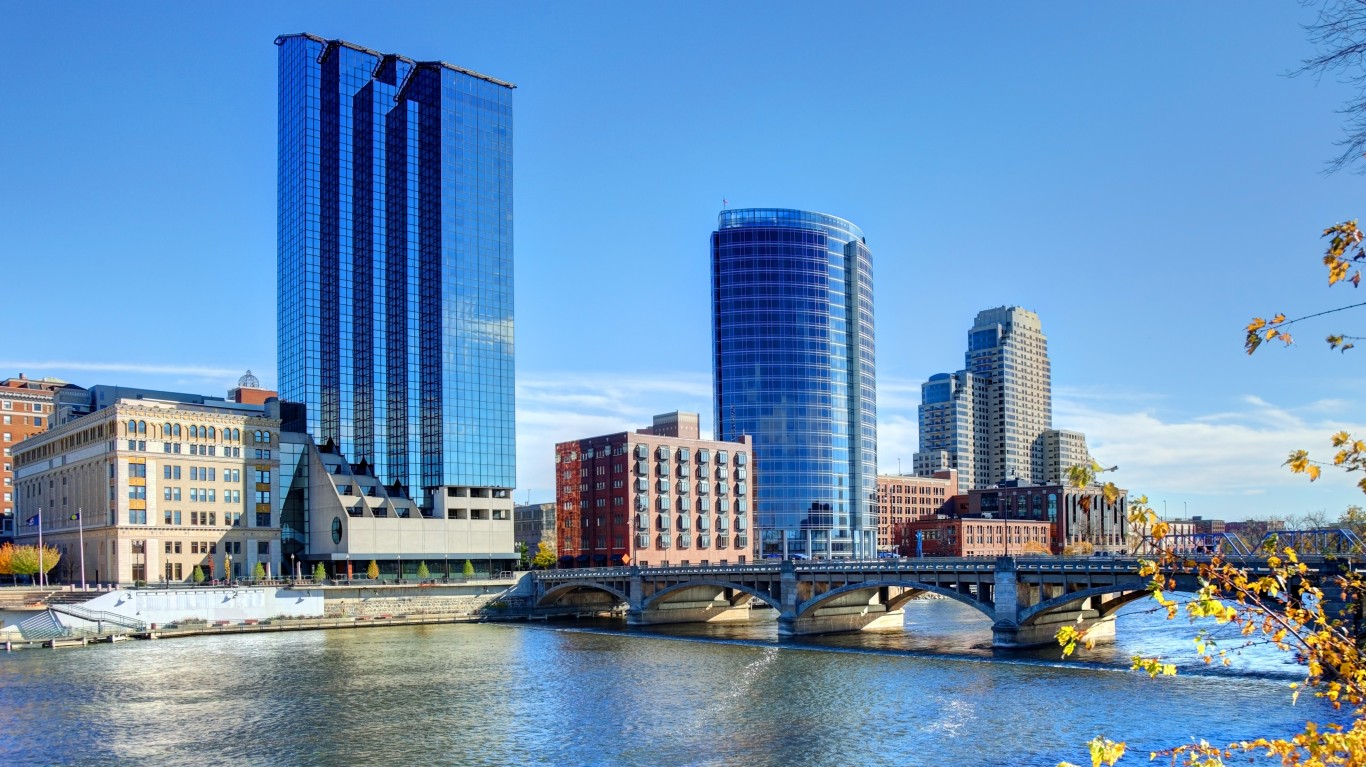
21. Grand Rapids, Michigan
> Score: 75.6 (Avg: 65.50)
> Rank in spring of 2019: 44th worst city
> PM2.5 pollution 24-hr average: 24 µg/m3 (EPA’s standard is 35 µg/m3)
> Population: 1,050,440

20. Syracuse, New York
> Score: 76.1 (Avg: 65.50)
> Rank in spring of 2019: 12th worst city
> PM2.5 pollution 24-hr average: 25 µg/m3 (EPA’s standard is 35 µg/m3)
> Population: 654,705
[in-text-ad]
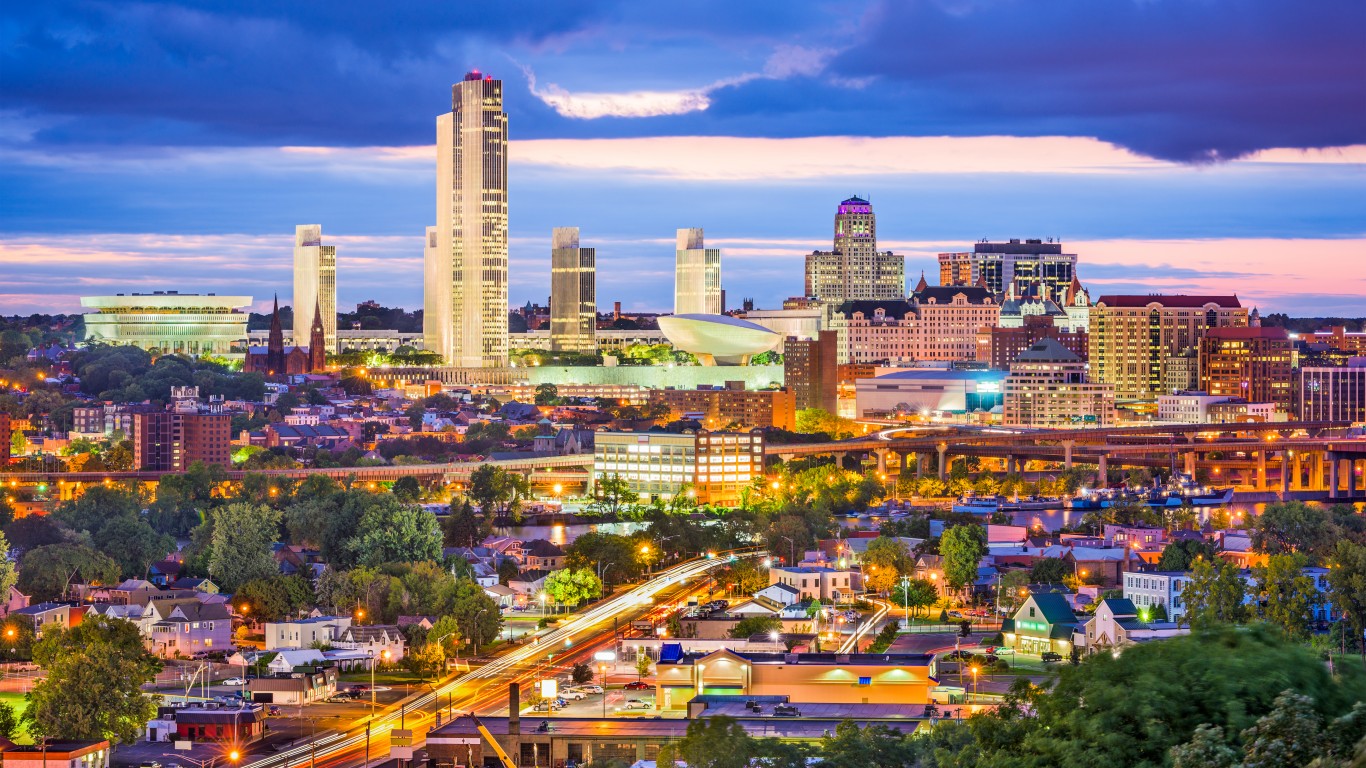
19. Albany, New York
> Score: 77.3 (Avg: 65.50)
> Rank in spring of 2019: 29th worst city
> PM2.5 pollution 24-hr average: 58 µg/m3 (EPA’s standard is 35 µg/m3)
> Population: 880,481
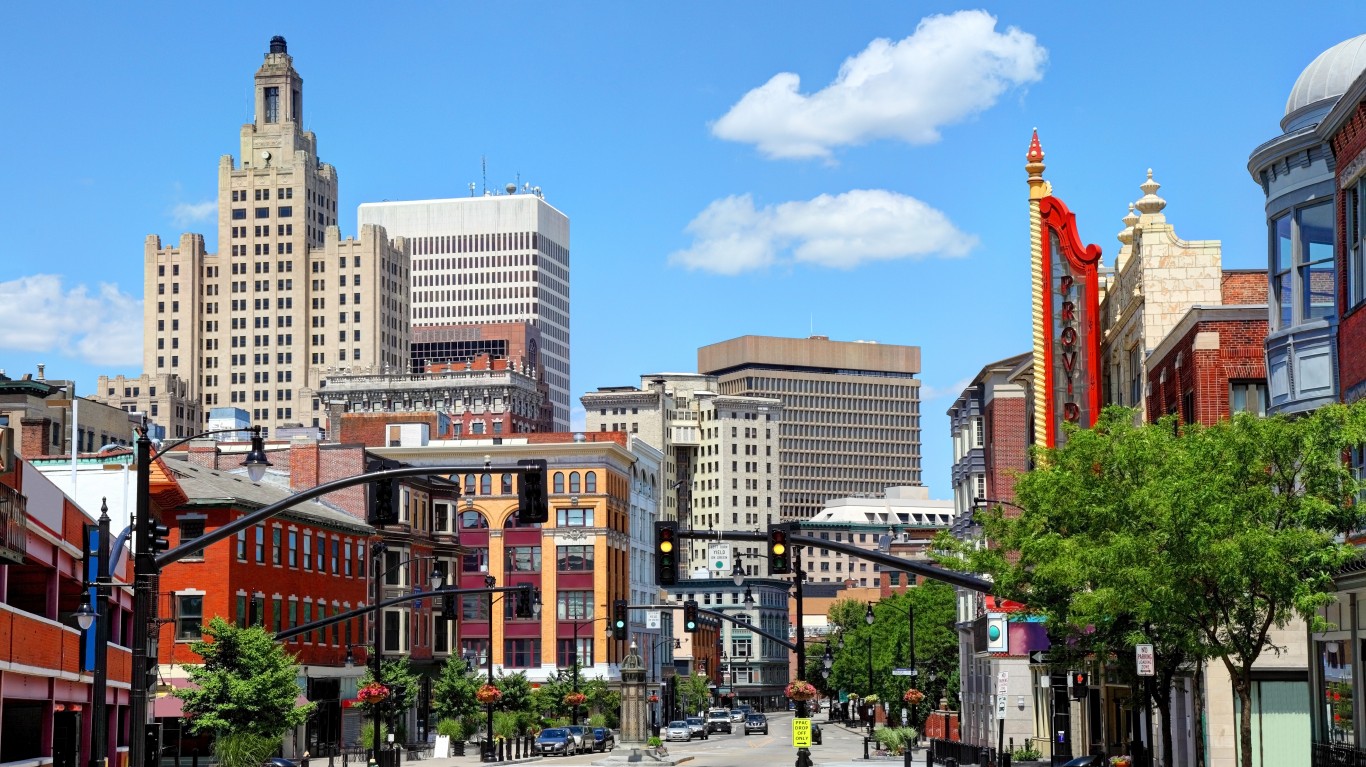
18. Providence, Rhode Island
> Score: 77.7 (Avg: 65.50)
> Rank in spring of 2019: 3rd worst city
> PM2.5 pollution 24-hr average: 36 µg/m3 (EPA’s standard is 35 µg/m3)
> Population: 1,615,516
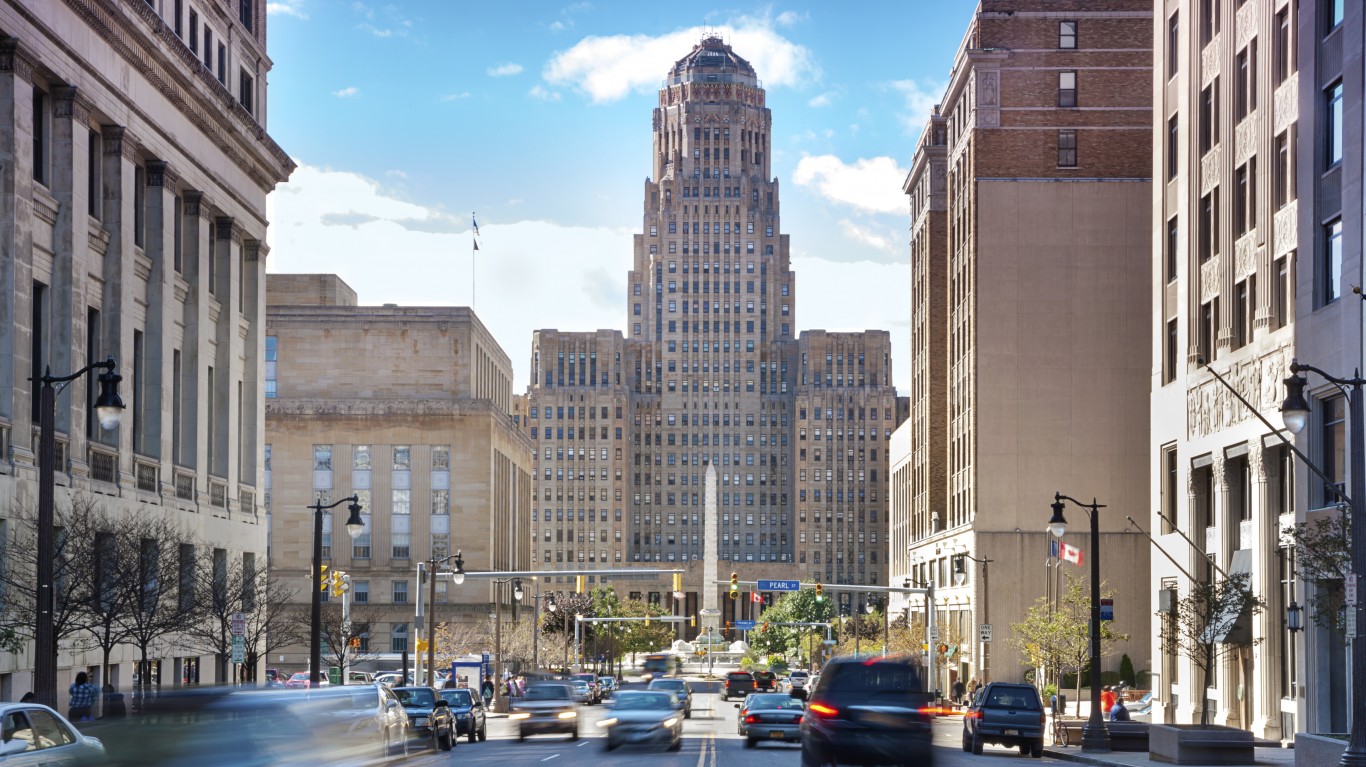
17. Buffalo, New York
> Score: 77.7 (Avg: 65.50)
> Rank in spring of 2019: 16th worst city
> PM2.5 pollution 24-hr average: 48 µg/m3 (EPA’s standard is 35 µg/m3)
> Population: 1,131,570
[in-text-ad-2]
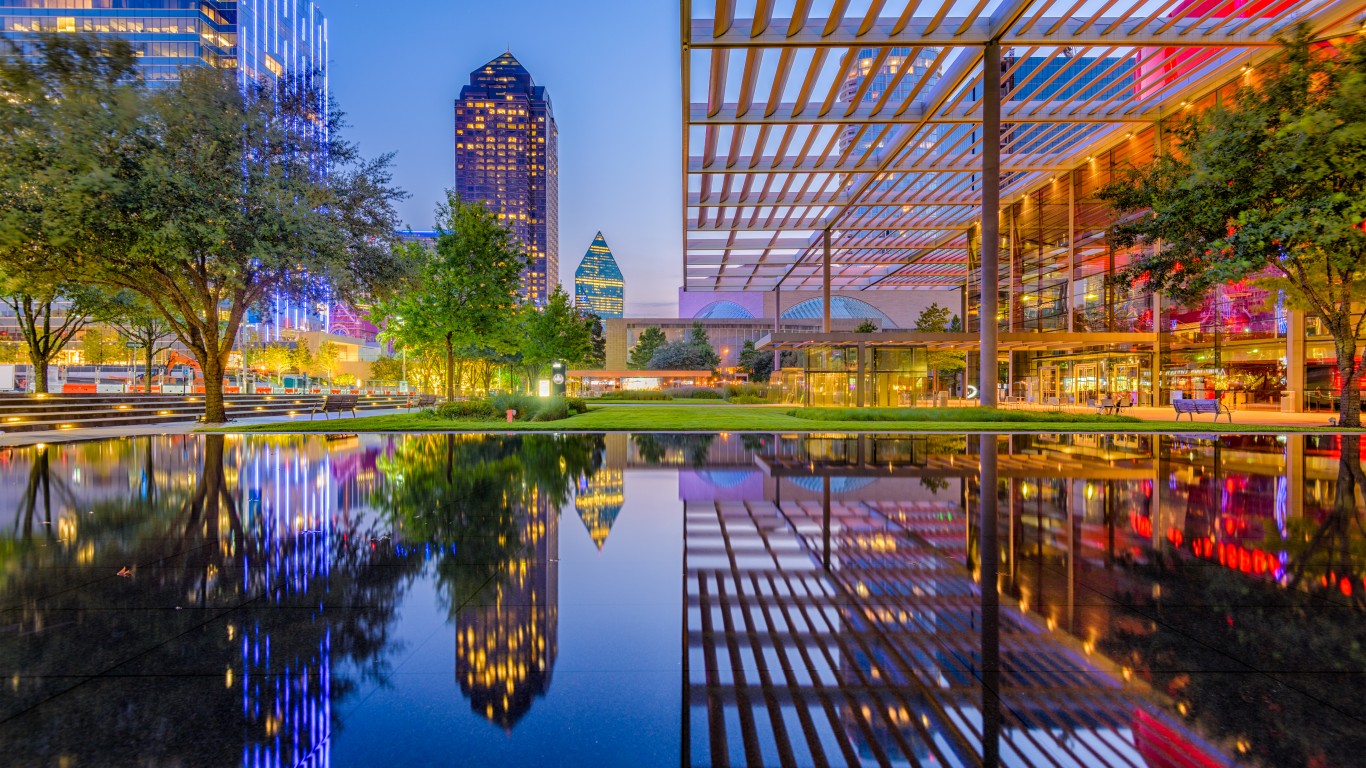
16. Dallas, Texas
> Score: 77.8 (Avg: 65.50)
> Rank in spring of 2019: 45th worst city
> PM2.5 pollution 24-hr average: 80 µg/m3 (EPA’s standard is 35 µg/m3)
> Population: 7,255,028
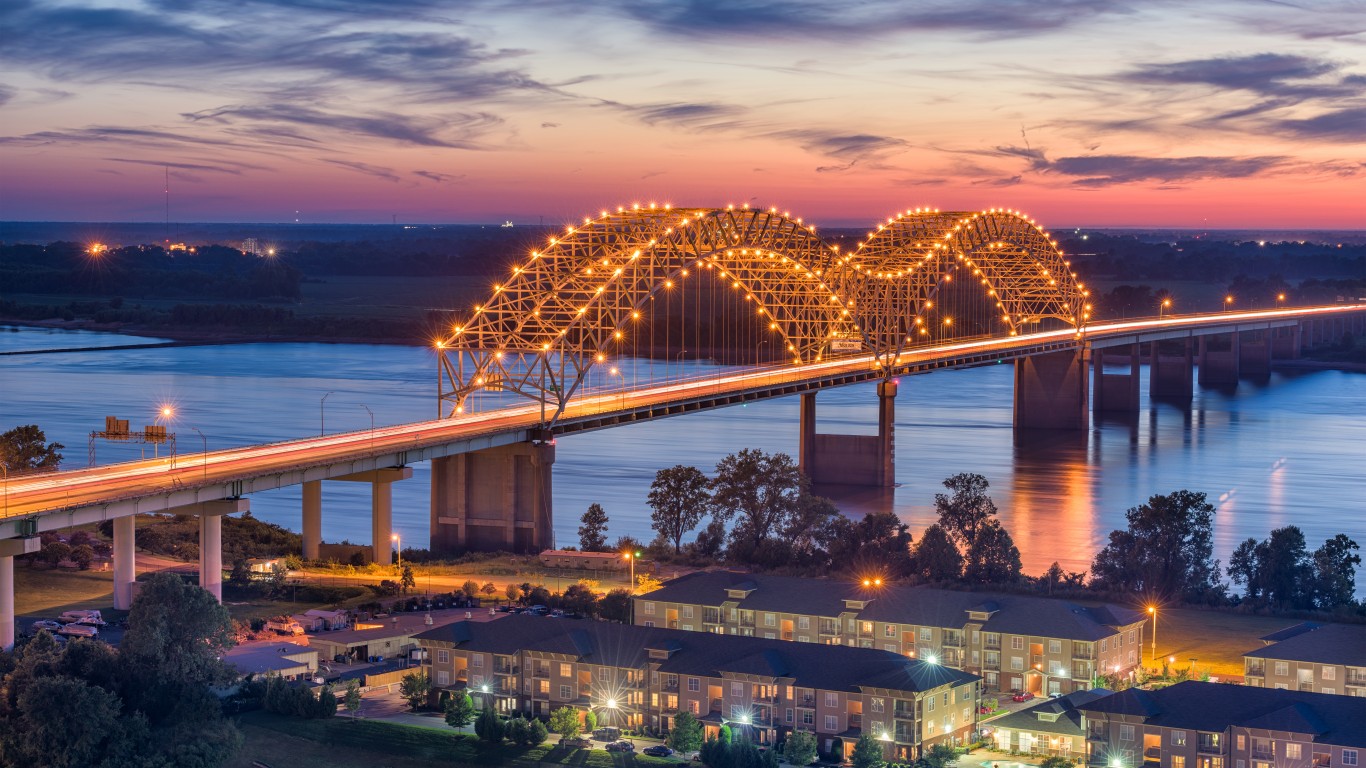
15. Memphis, Tennessee
> Score: 78.4 (Avg: 65.50)
> Rank in spring of 2019: 4th worst city
> PM2.5 pollution 24-hr average: 114 µg/m3 (EPA’s standard is 35 µg/m3)
> Population: 1,345,991
[in-text-ad]
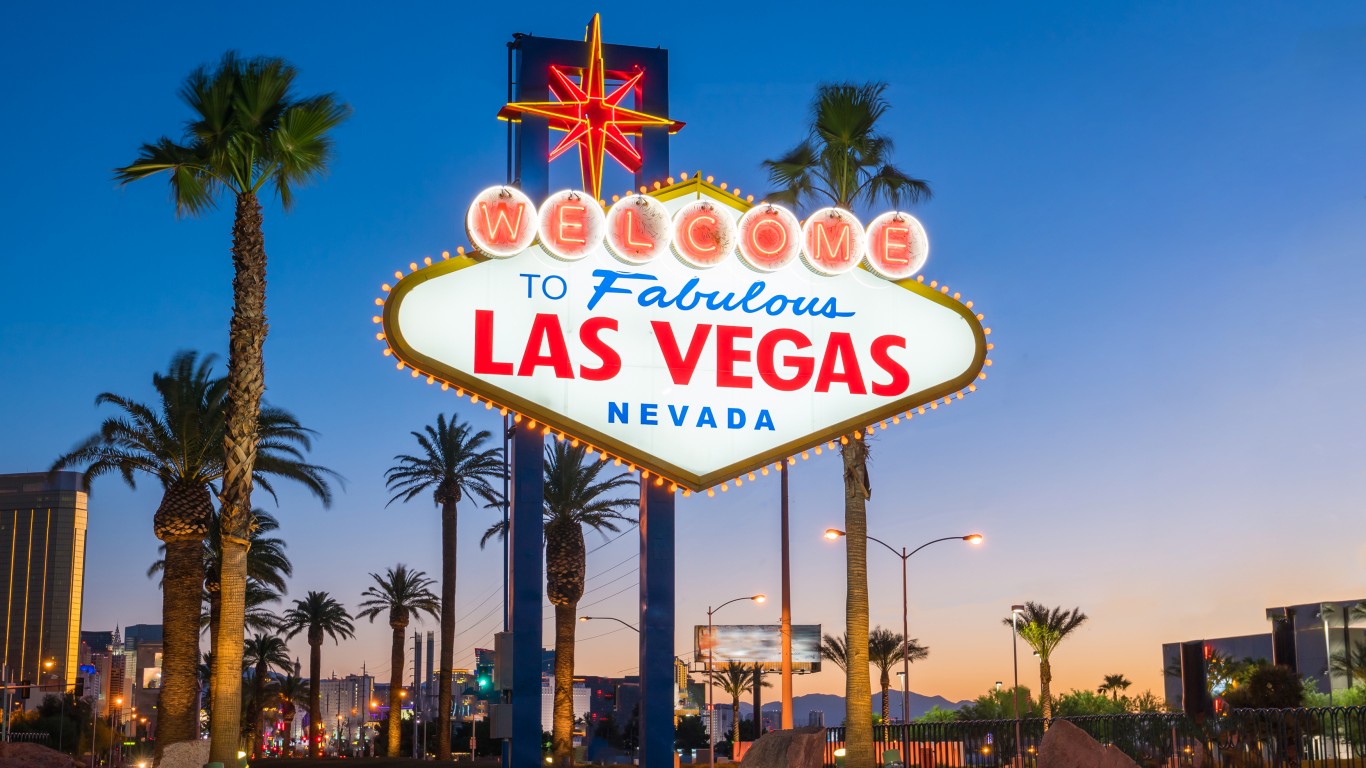
14. Las Vegas, Nevada
> Score: 80.2 (Avg: 65.50)
> Rank in spring of 2019: 34th worst city
> PM2.5 pollution 24-hr average: 29 µg/m3 (EPA’s standard is 35 µg/m3)
> Population: 2,141,574
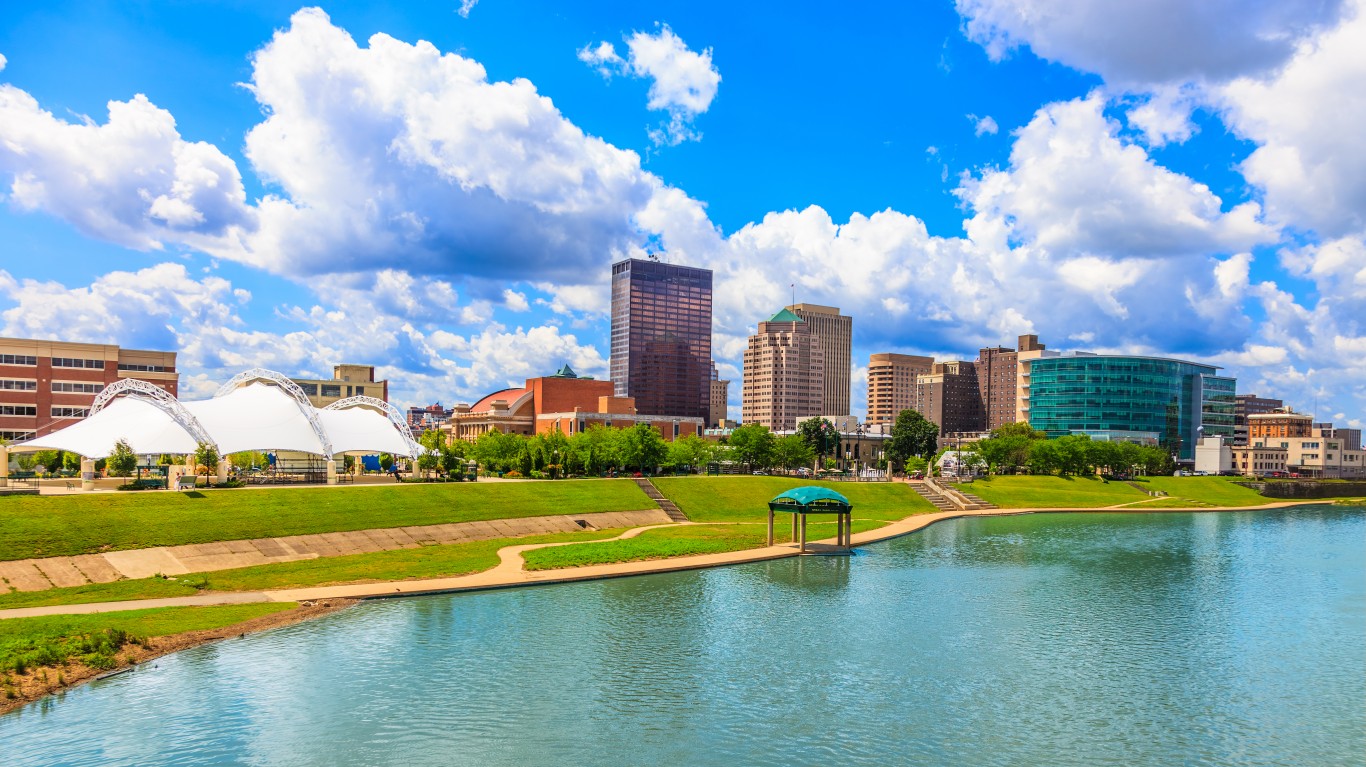
13. Dayton, Ohio
> Score: 81.2 (Avg: 65.50)
> Rank in spring of 2019: 13th worst city
> PM2.5 pollution 24-hr average: 93 µg/m3 (EPA’s standard is 35 µg/m3)
> Population: 802,645
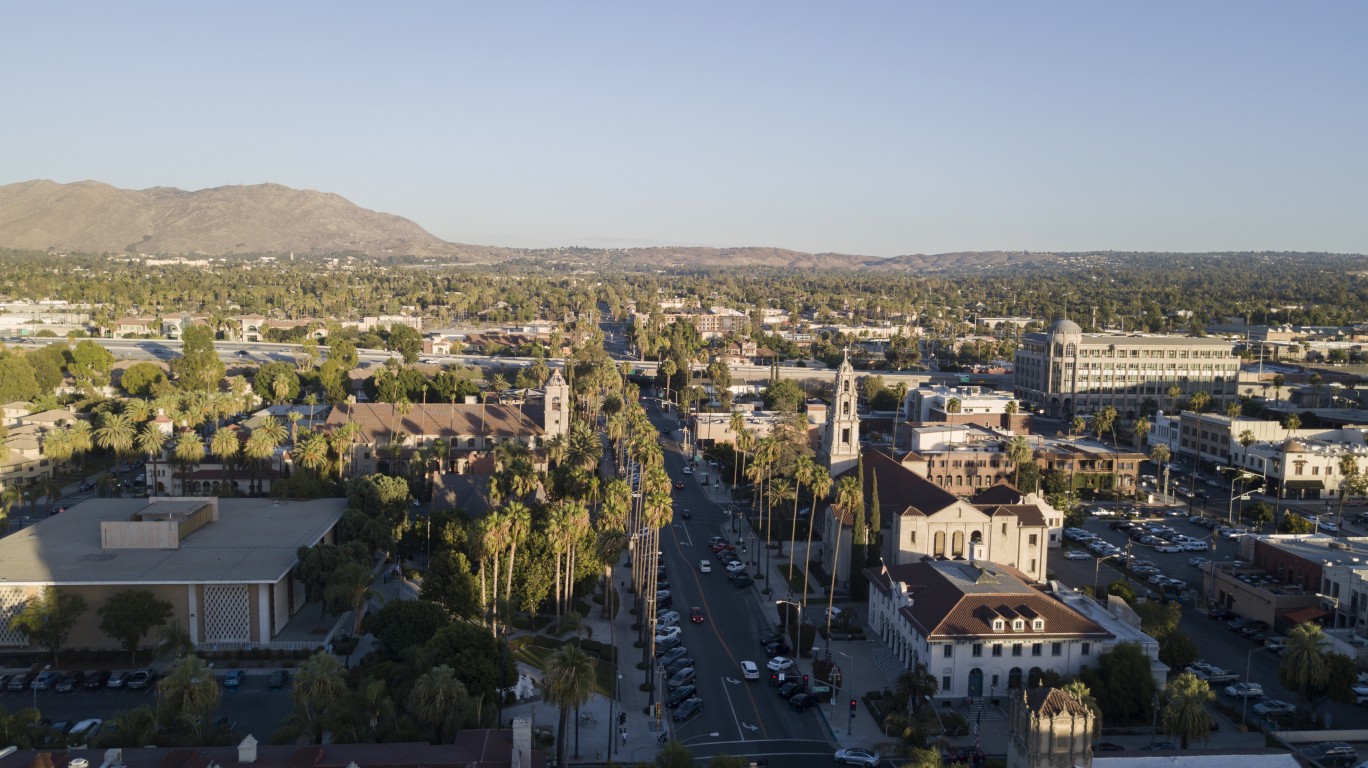
12. Riverside, California
> Score: 82.0 (Avg: 65.50)
> Rank in spring of 2019: 52th worst city
> PM2.5 pollution 24-hr average: 43 µg/m3 (EPA’s standard is 35 µg/m3)
> Population: 4,518,699
[in-text-ad-2]

11. Virginia Beach, Virginia
> Score: 82.3 (Avg: 65.50)
> Rank in spring of 2019: 50th worst city
> PM2.5 pollution 24-hr average: 58 µg/m3 (EPA’s standard is 35 µg/m3)
> Population: 1,722,001

10. Pittsburgh, Pennsylvania
> Score: 85.1 (Avg: 65.50)
> Rank in spring of 2019: 41th worst city
> PM2.5 pollution 24-hr average: 164 µg/m3 (EPA’s standard is 35 µg/m3)
> Population: 2,339,941
[in-text-ad]
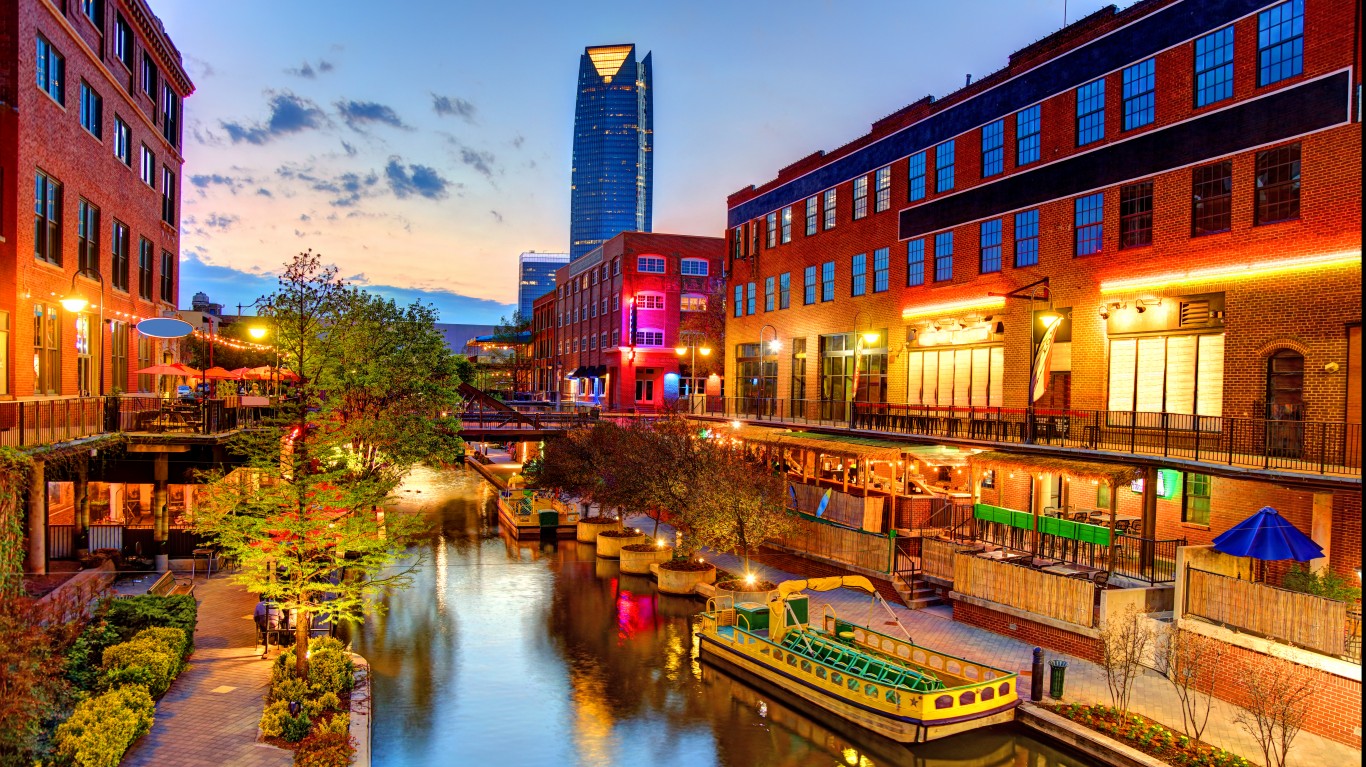
9. Oklahoma City, Oklahoma
> Score: 86.1 (Avg: 65.50)
> Rank in spring of 2019: 18th worst city
> PM2.5 pollution 24-hr average: 106 µg/m3 (EPA’s standard is 35 µg/m3)
> Population: 1,369,759
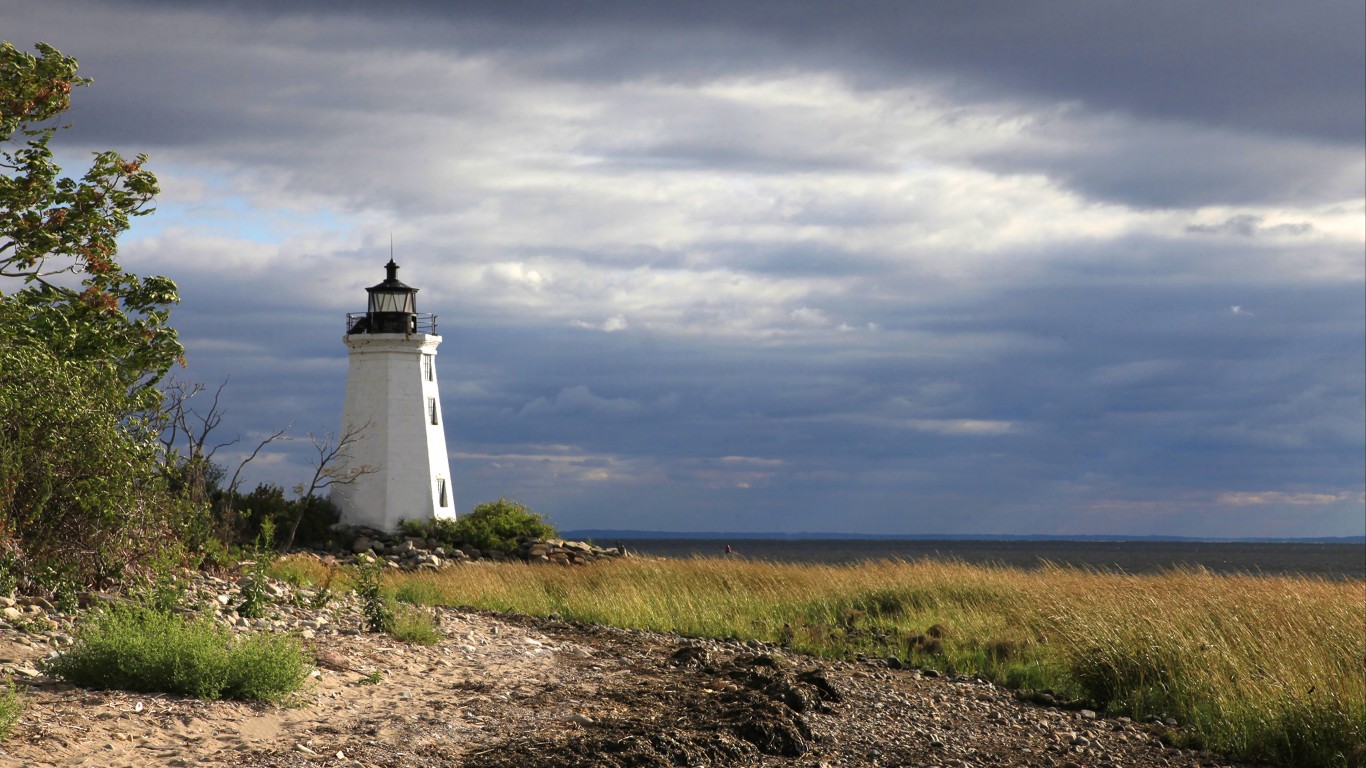
8. Bridgeport, Connecticut
> Score: 86.7 (Avg: 65.50)
> Rank in spring of 2019: 40th worst city
> PM2.5 pollution 24-hr average: 74 µg/m3 (EPA’s standard is 35 µg/m3)
> Population: 944,348
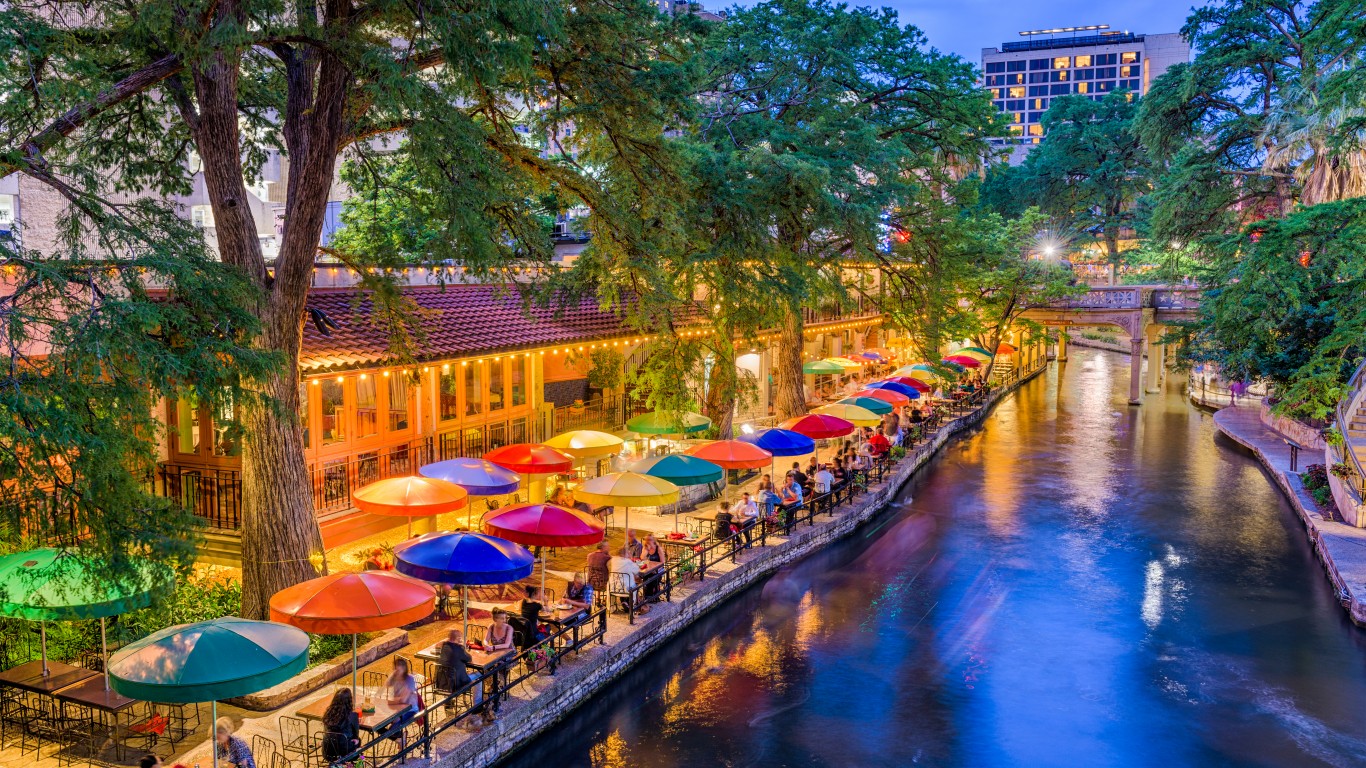
7. San Antonio, Texas
> Score: 87.2 (Avg: 65.50)
> Rank in spring of 2019: 14th worst city
> PM2.5 pollution 24-hr average: 169 µg/m3 (EPA’s standard is 35 µg/m3)
> Population: 2,426,204
[in-text-ad-2]
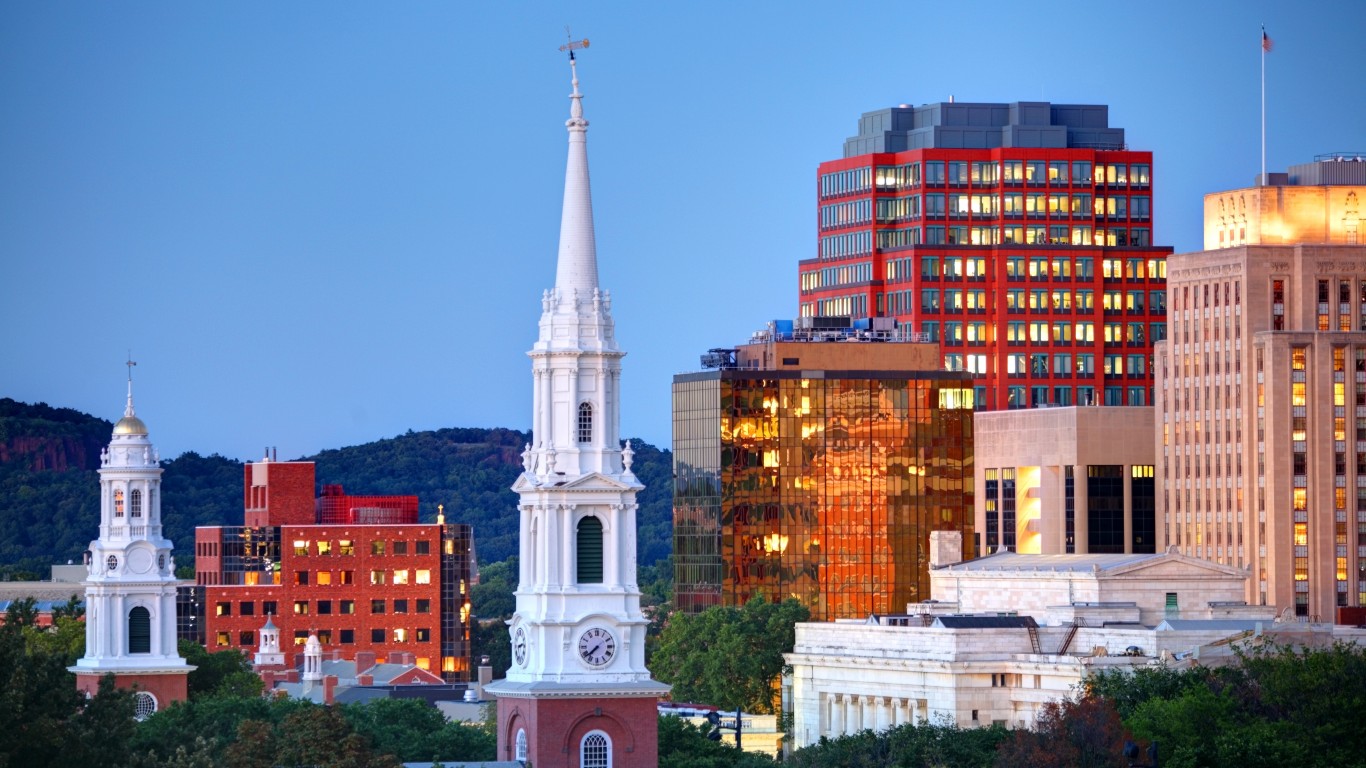
6. New Haven, Connecticut
> Score: 87.3 (Avg: 65.50)
> Rank in spring of 2019: 23rd worst city
> PM2.5 pollution 24-hr average: 49 µg/m3 (EPA’s standard is 35 µg/m3)
> Population: 859,339
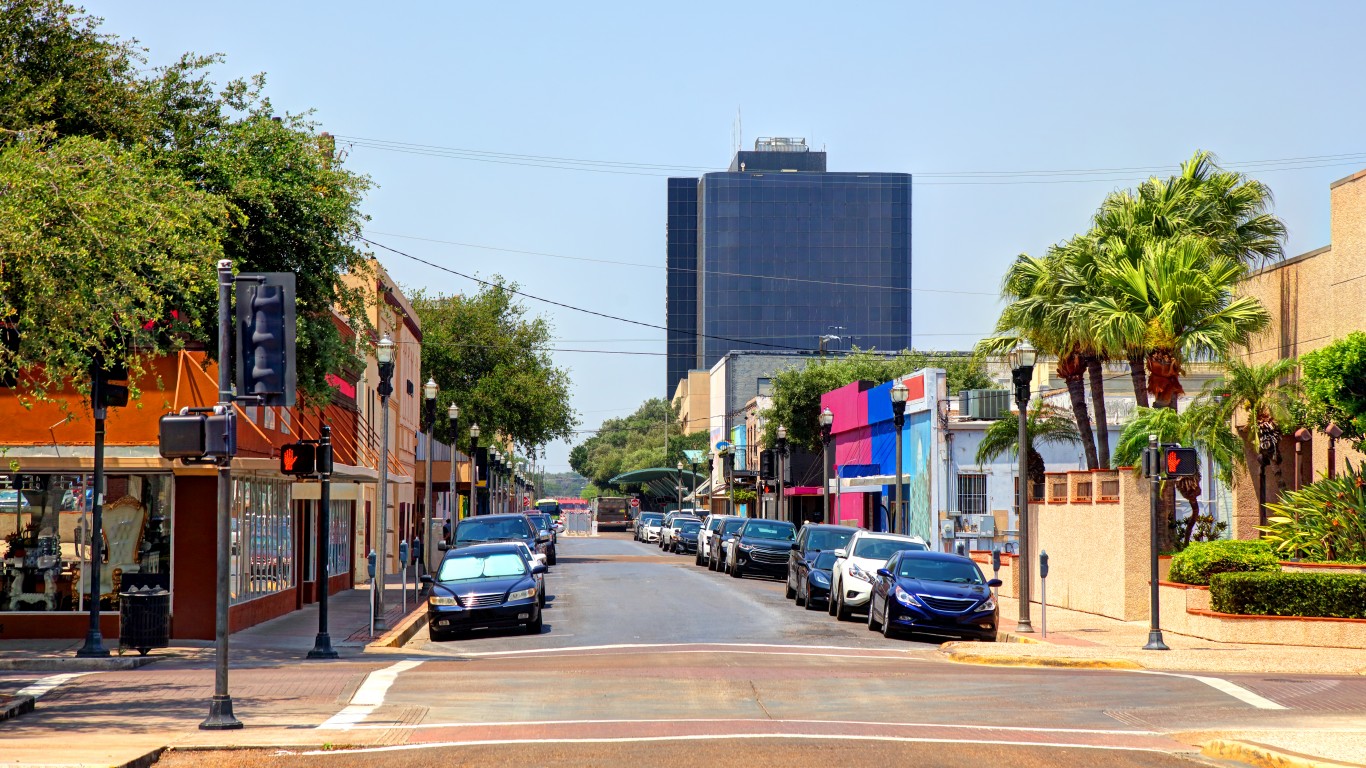
5. McAllen, Texas
> Score: 87.5 (Avg: 65.50)
> Rank in spring of 2019: 1stworst city
> PM2.5 pollution 24-hr average: 120 µg/m3 (EPA’s standard is 35 µg/m3)
> Population: 849,389
[in-text-ad]
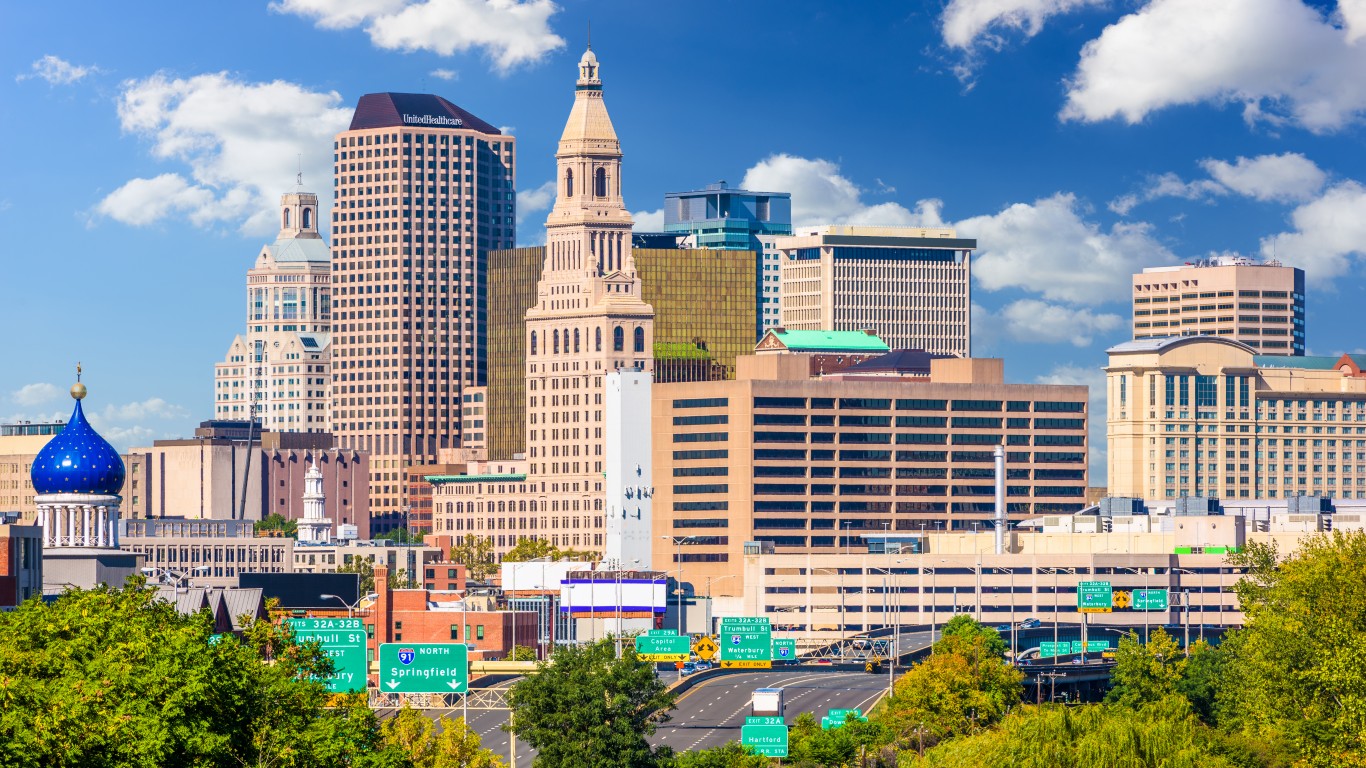
4. Hartford, Connecticut
> Score: 90.1 (Avg: 65.50)
> Rank in spring of 2019: 22th worst city
> PM2.5 pollution 24-hr average: 39 µg/m3 (EPA’s standard is 35 µg/m3)
> Population: 1,209,367
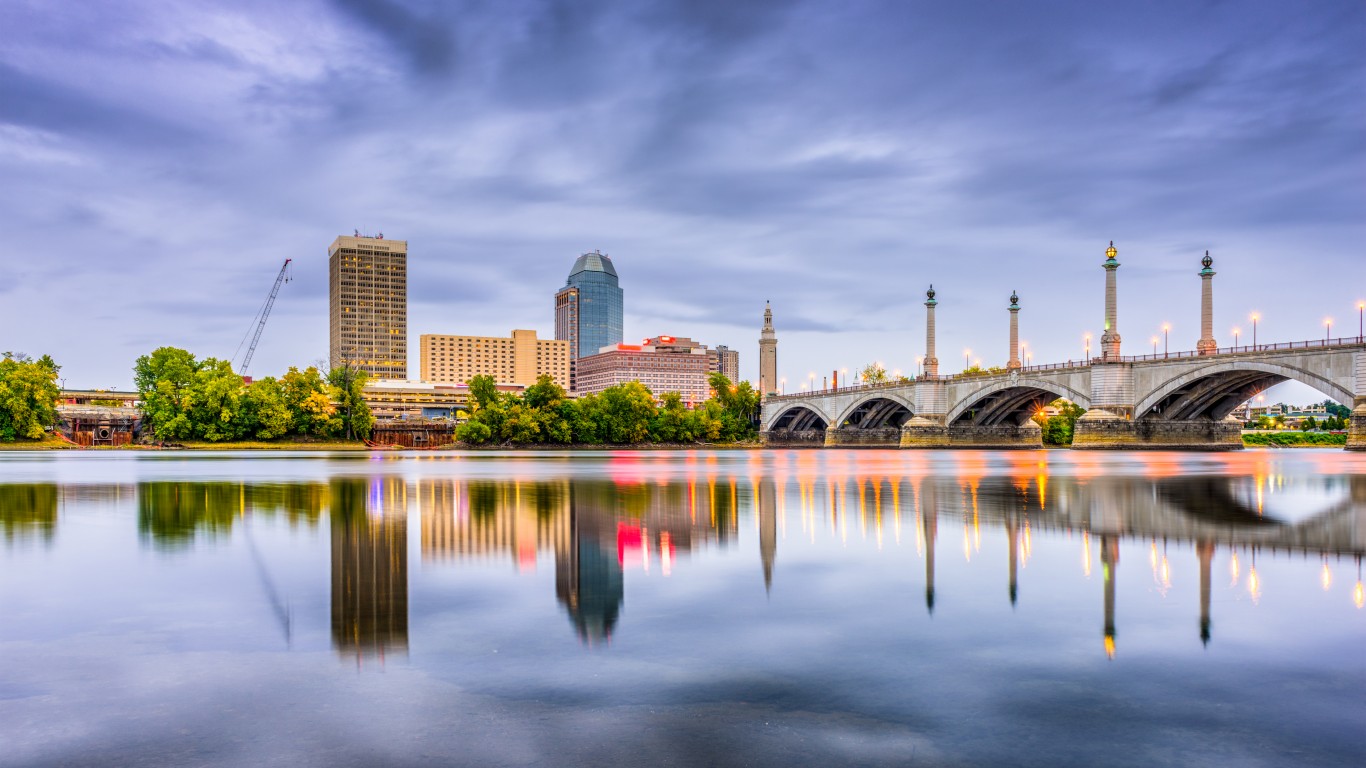
3. Springfield, Massachusetts
> Score: 90.5 (Avg: 65.50)
> Rank in spring of 2019: 5th worst city
> PM2.5 pollution 24-hr average: 70 µg/m3 (EPA’s standard is 35 µg/m3)
> Population: 630,275
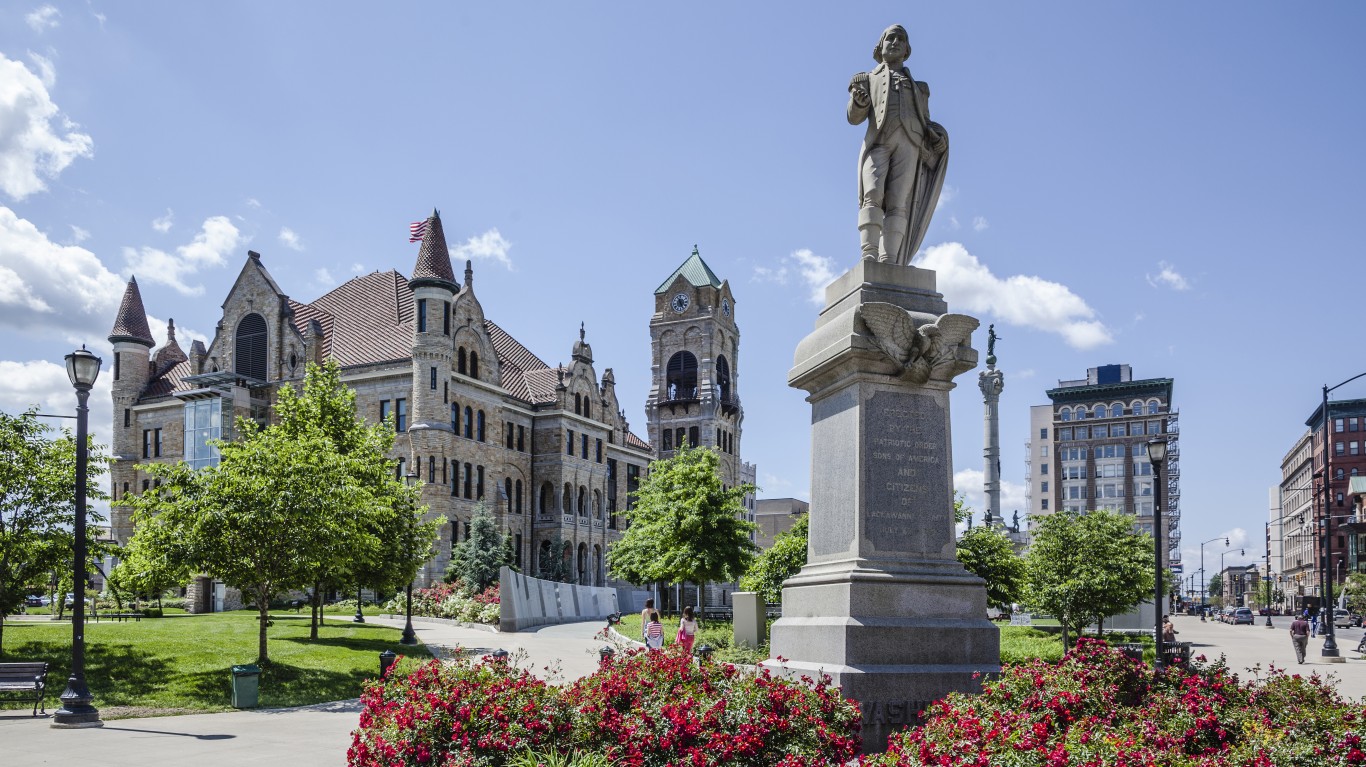
2. Scranton, Pennsylvania
> Score: 98.5 (Avg: 65.50)
> Rank in spring of 2019: 8th worst city
> PM2.5 pollution 24-hr average: 15 µg/m3 (EPA’s standard is 35 µg/m3)
> Population: 556,926
[in-text-ad-2]
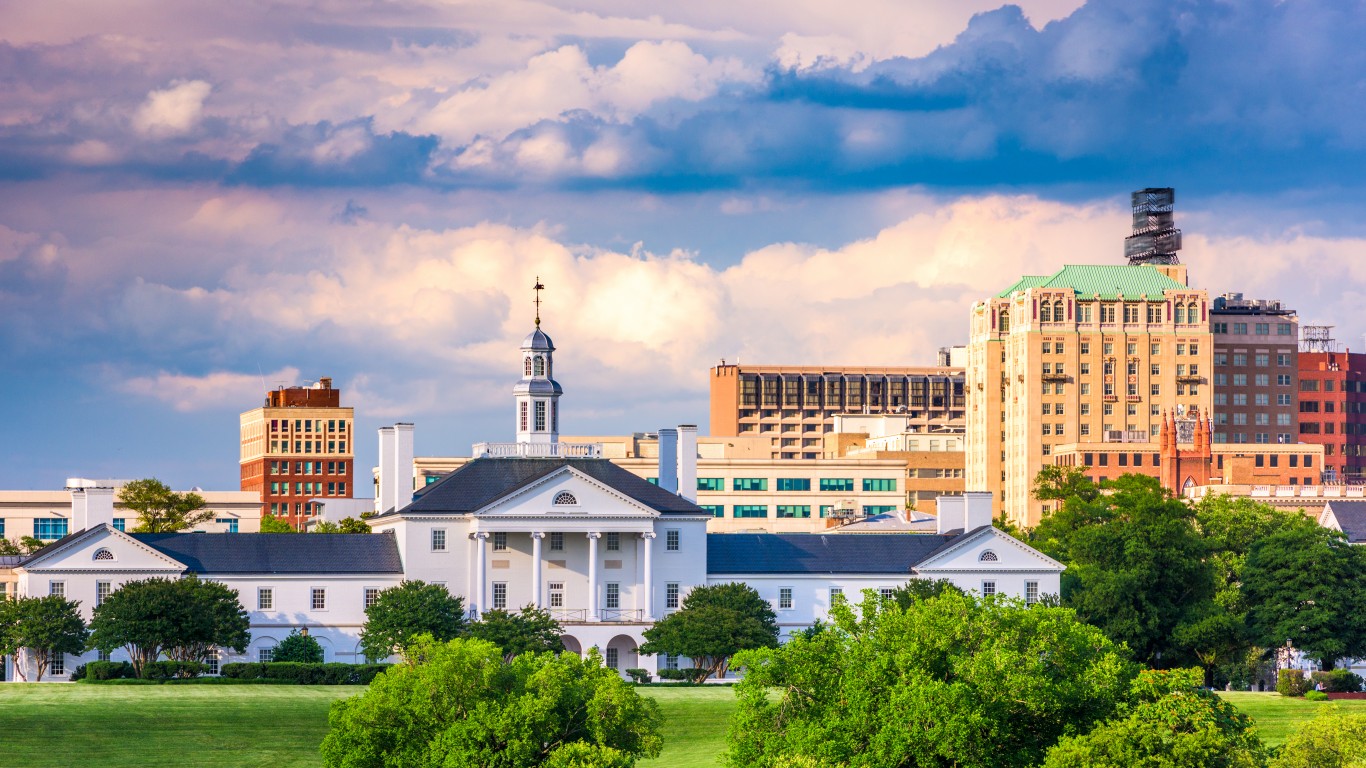
1. Richmond, Virginia
> Score: 100.0 (Avg: 65.50)
> Rank in spring of 2019: 10th worst city
> PM2.5 pollution 24-hr average: 68 µg/m3 (EPA’s standard is 35 µg/m3)
> Population: 1,281,530
Retirement planning doesn’t have to feel overwhelming. The key is finding expert guidance—and SmartAsset’s simple quiz makes it easier than ever for you to connect with a vetted financial advisor.
Here’s how it works:
Why wait? Start building the retirement you’ve always dreamed of. Click here to get started today!
Thank you for reading! Have some feedback for us?
Contact the 24/7 Wall St. editorial team.